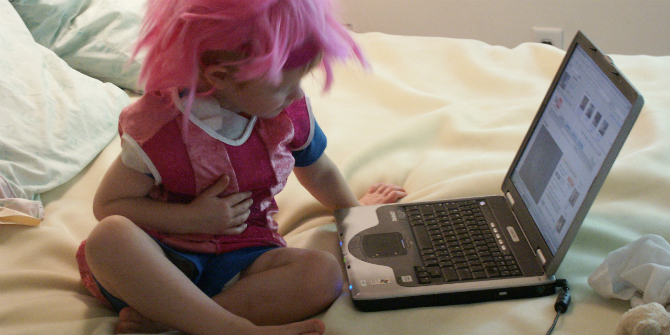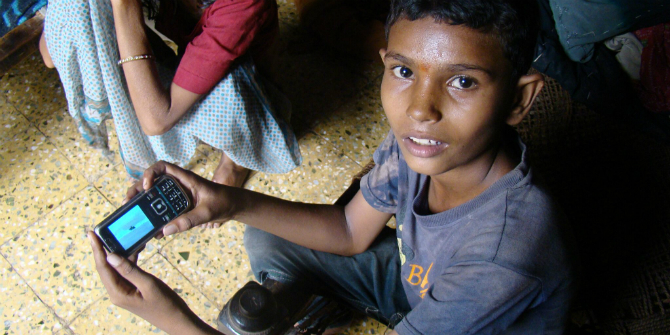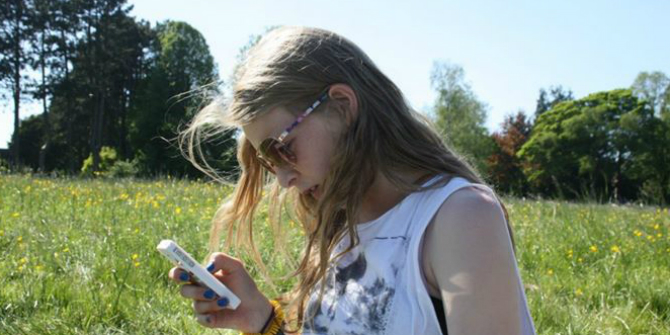 Common Sense Media’s latest report, co-authored with USC Annenberg, into the ‘new normal’ of media use in UK families reveals that while parents report a sense of anxiety and some conflict with their teens around media, most believe that digital technologies have actually reduced tensions. Despite anxiety, both parents and teens are largely optimistic about the benefits their devices bring, writes Sonia Livingstone. Sonia is Professor of Social Psychology in the Department of Media and Communications at the London School of Economics and Political Science.
Common Sense Media’s latest report, co-authored with USC Annenberg, into the ‘new normal’ of media use in UK families reveals that while parents report a sense of anxiety and some conflict with their teens around media, most believe that digital technologies have actually reduced tensions. Despite anxiety, both parents and teens are largely optimistic about the benefits their devices bring, writes Sonia Livingstone. Sonia is Professor of Social Psychology in the Department of Media and Communications at the London School of Economics and Political Science.
New research released today, co-authored by USC Annenberg and Common Sense Media, the US’s best-known non-profit organisation for children’s media research, advocacy and parenting advice, gives an insight into the ‘new normal’ for UK families in the digital age. Its survey of UK 13- to 17-year-olds and their parents, focusing on ‘screen time’ and the thorny question of ‘addiction’, shows that:
- Nearly half of parents (46%) and teens (44%) describe themselves as ‘addicted’ to their mobile device; also, a third of teens (35%) and two-thirds of parents (63%) think the other is ‘addicted’ too.
- Half of teens (54%) and parents (51%) say they get distracted by mobile devices at least once a day, and 72% of parents say their teen gets distracted.
- Screen time conflicts are common in today’s families with children – ranking as the third most common source of conflict for parents after chores/helping around the house and bedtime/sleep, and ranking fourth for teens (after chores, sleep and homework conflicts).
Yet 86% of parents say their teen’s use of mobile devices has not harmed or has even helped their relationship; and 97% of teens say the same of their parents’ mobile use. Further, most UK families do not think mobile devices disrupt meal times, most parents allow their teens their privacy online, and most are optimistic about the benefits. Relatedly, another Common Sense Media survey recently reported in the US that for most teens, their use of mobile devices reassures, connects and reduces tension more than the opposite. And Ofcom, which prefers the term ‘dependency’ to ‘addiction’, finds from its annual UK survey of parents and children that most parents say their child maintains a good balance between screen-based and other activities.
Families finding a digital balance
So what is the ‘new normal’ of family life? The findings point, somewhat contradictorily, to the widespread perception of a problem (‘addiction’), some evidence of distraction and conflict, and yet some broadly positive views of digital technology, with families generally finding a balance between digital and other activities that suits them.
Anyone following this blog will know that we question interpretations that draw simple causal conclusions about the effects of increasing use of digital technologies. We also recognise the wider expert debate over the clinical diagnosis of screen addictions, and we critique the panicking headlines. Instead, we try to look more broadly into why children rely on digital devices. We try to be careful before concluding that the 79% of teens who check their devices within 30 minutes of waking up have a problem (when I wake, I too turn quickly to my phone for the time, the weather, any urgent messages, my diary, to turn on the radio – and I consider that’s okay). And we try to be aware that the world we have designed for teens is often a world of limited freedom to go outside or meet friends, of intense social and academic pressures, and of cuts to offline provision of youth services of all kinds.
So when I learn from Common Sense Media that if UK teens had to go without their mobile devices for a day, the most common emotion they’d feel would be boredom – 66% say this, followed by anxiety (44%) and loneliness (40%) – I don’t jump to the conclusion that there’s something wrong with today’s young generation. Rather I ask, first, what they are doing on their phones and what do they value about that and, second, what alternatives has society really provided for them, and are these both sufficient and available? And I would say the same in defence of parents’ mobile use.
How does the UK compare?
Willow Bay, Dean of the USC Annenberg School for Communication and Journalism and report author, explained to me that this new research is part of a ‘global mapping project’ that has already conducted surveys in the US and Japan. Focusing on parents, the cross-national comparative findings are thought-provoking:
- More parents in the UK ‘feel addicted’ to their devices (46% vs. 27% of parents in the US and 38% in Japan).
- UK teens agree! 35% think their parents are ‘addicted’ compared with 28% in the US and 27% in Japan.
- More parents in the UK feel the need to respond immediately to texts, messages and other notifications (57% vs. 48% in the US and 36% in Japan).
- Yet more American parents report checking their mobile devices at least hourly, and more argue daily about mobile device use (36%) than do British (22%) or Japanese (19%) parents.
So it seems that British parents are feeling worse about themselves, and under more pressure, even though they don’t necessarily use their phones more or create more conflict. I’ll leave others to explain the US and Japanese findings, but I am tempted to suggest that the high-profile UK media coverage constantly scrutinising and judging families’ once-private communication practices is itself part of the problem here. Perhaps this is why both the Common Sense Media survey and our recent Parenting for a Digital Future survey find that screen time per se generates more family conflict than what children are actually doing online.
When families say they’re ‘addicted’, they surely don’t mean to make a serious clinical diagnosis. I suggest this is a way of opening up a space to reflect on how they have come to rely on digital technology and whether they need to make some changes. It’s also a way to express their uncertainties and sense of lack of control over their digital lives at a time of rapid and complex technological change. The problem with calling this ‘addiction’ is that it implies people can and should simply cut down or disengage – even that they are morally failing to cope.
Yet notwithstanding the huge resources going into the widespread digitisation of everything from schooling to government to the workplace, the Parenting for a Digital Future project is finding that parents are often unsupported by others – society, community, family, tech companies – in facing the digital world. Maybe, then, it’s society’s responsibility to support families struggling with the ‘new normal’ that we should focus on.
This post gives the views of the author and does not represent the position of the LSE Parenting for a Digital Future blog, nor of the London School of Economics and Political Science.





